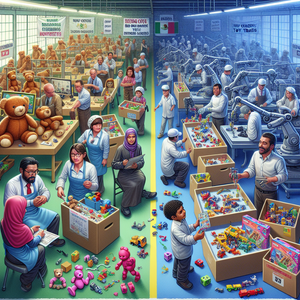
Navigating Auto Tariffs: Risks, Opportunities, and Emerging Careers in the U.S. Automotive Industry
The U.S. automotive industry is weathering a profound shift as new tariffs, such as a 25% levy on imported vehicles and parts, rewrite the rules of manufacturing and trade. These tariffs have ignited heated discussions: proponents argue they will rejuvenate domestic production, while critics foresee job losses, disrupted supply chains, and higher prices for consumers. According to Cox Automotive, North American car production could plummet by 10-20% under these tariffs, potentially triggering widespread layoffs. Despite these challenges, the industry is not standing still. Companies are adapting to the new reality, creating opportunities in automation, logistics, sustainability, and compliance. These shifts mark a turning point for the automotive workforce, where some traditional roles face decline while new ones emerge.
Job Summaries:
The Impact of Tariffs: Risks and Opportunities:
- Tariffs on imported vehicles and parts pose significant risks, including potential job losses, rising costs, and supply chain challenges.
- They present opportunities such as a resurgence in domestic manufacturing, the emergence of new careers, and workforce upskilling.
- Companies and workers who adapt to these changes can thrive in the evolving landscape.
Automotive Supply Chain Manager:
- This role focuses on developing efficient strategies to maintain production amid tariff-induced disruptions.
- Key responsibilities include rerouting shipments, renegotiating contracts, and minimizing delays.
- A bachelor's degree in logistics, business, or supply chain management is typically required.
Tariff Compliance Specialist:
- Specialists navigate trade laws, calculate tariff impacts, and ensure regulatory compliance.
- They mitigate penalties and ensure seamless imports and exports, requiring a background in international business, law, or economics.
Manufacturing Engineer:
- Manufacturing engineers optimize production processes and facilitate factory retooling for domestic manufacturing.
- They integrate cost-effective technologies to offset tariff expenses.
- Requiring a degree in mechanical or industrial engineering.
Logistics Coordinator:
- Logistics coordinators oversee the transportation of parts and products to ensure timely delivery.
- They address port delays, alternative shipping routes, and efficient warehouse management.
- Requiring expertise in logistics or supply chain management.
Trade Analyst:
- Trade analysts assess the economic impact of tariffs and provide strategic advice to executives.
- They forecast financial outcomes and identify cost-saving measures.
- Requiring a degree in economics, business, or finance.
Automation Technician:
- Automation technicians install and maintain automated systems in manufacturing plants.
- They reduce labor costs through robotics.
- Certifications or associate degrees in robotics or electrical systems are typically needed.
Customs Broker:
- Customs brokers facilitate seamless import/export operations for parts and vehicles, ensuring compliance with customs regulations.
- A certified customs broker license is required.
Automotive Production Supervisor:
- Supervisors manage assembly lines and oversee the transition to domestic production.
- They maintain productivity and quality standards, requiring manufacturing experience and leadership skills.
Economic Policy Advisor:
- Economic policy advisors guide companies on aligning business strategies with trade regulations.
- They analyze policy changes and advocate for the industry’s interests.
- Requiring a background in public policy, law, or economics.
Vehicle Export Specialist:
- Vehicle export specialists coordinate international vehicle shipments while managing compliance.
- They address retaliatory tariffs and ensure smooth logistics, requiring expertise in international trade and logistics.
Automotive Quality Assurance Engineer:
- Quality assurance engineers ensure vehicles meet safety and performance standards.
- They adapt to alternative materials while upholding quality, requiring a degree in engineering and quality control experience.
Aftermarket Parts Specialist:
- Aftermarket parts specialists source and distribute replacement parts.
- They find cost-effective suppliers and manage inventory, requiring knowledge of automotive systems and supply chain management.
Industrial Automation Engineer:
- Industrial automation engineers design robotic systems to improve manufacturing efficiency.
- They streamline production to reduce labor reliance, requiring a degree in engineering and programming expertise.
Automotive Marketing Manager:
- Marketing managers create campaigns addressing consumer concerns over rising vehicle prices.
- They require marketing experience and an understanding of the automotive industry.
Sustainability Specialist:
- Sustainability specialists develop eco-friendly production strategies, reducing environmental impact while cutting costs.
- They require a degree in environmental science or engineering.
The U.S. automotive industry stands at a crossroads, where tariffs have created both uncertainty and opportunity. While challenges like job losses and supply chain disruptions loom large, a new wave of careers is emerging, driven by innovation, sustainability, and compliance. Workers who embrace these changes and invest in upskilling can not only survive but thrive in this evolving landscape. The road ahead may be bumpy, but for those ready to adapt, it’s a journey worth taking.
Explore More Jobs

